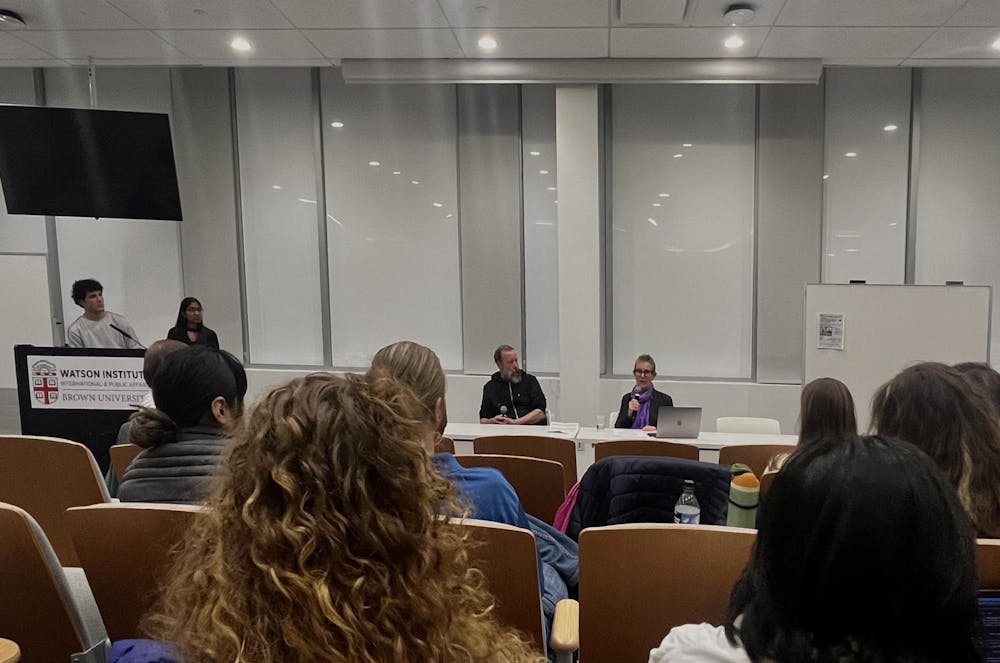On Wednesday, housing advocates Jennifer Wood and Kevin Simon spoke at the Watson Institute for International and Public Affairs about recent developments in anti-homeless litigation, both federally and locally.
The event was organized by Housing Opportunities for People Everywhere, a student organization that is motivated by the “fundamental ideology that housing is a human right,” according to Calvin Kirk ’25, who introduced the event.
Both Wood and Simon noted significant increases in Providence’s unhoused population and in bureaucratic measures restricting the actions of unhoused people in recent years.
Before the COVID-19 pandemic, there was an average of 70 to 80 people sleeping outside in Providence every night. “Now the number is over 700,” said Simon, the director of outreach and communications at Mathewson Street Church, a local Methodist church that provides support to unhoused people.
“In the last decade, there’s been kind of an epidemic of ordinances and local level legislation to micromanage and punish homelessness,” said Wood, the executive director of the Rhode Island Center for Justice, a Providence-based nonprofit providing legal support to vulnerable and unhoused people in Rhode Island.
Since June, many municipal ordinances surrounding homelessness have been affected by the Supreme Court decision City of Grants Pass v. Johnson, which held that it’s constitutional for municipalities to prohibit and penalize sleeping outside on public property.
“The entire balance of power around how encampments are handled by municipal officials and state officials has been profoundly impacted by the Supreme Court’s decision,” Wood said.
An earlier ruling by the Ninth Circuit ruled differently, holding that it was unconstitutional to enforce penalties on homelessness that force individuals to sleep outside overnight. She said this inspired municipalities to re-examine their anti-homelessness litigation, while the Supreme Court decision led to increased enforcement of these regulations.
In the past few years, there have been significant raids of encampments of unhoused people throughout the Providence area, Simon said. He described these events as “incredibly traumatizing.”
Unhoused immigrants are particularly vulnerable, Wood noted. She said that when living outside, “you’re much more likely to come to the attention of people who may have an outstanding order of deportation or the ability to detain or deport.”
But Simon said that there are a variety of initiatives working to reaffirm rights for unhoused people in Providence. “Five days a week, we provide a safe space for people to come in and have breakfast and lunch,” Simon said about the role of Mathewson Street Church. “We have clothing there … and we do a lot of documentation work.”
Rhode Island is one of three states in the nation that has formally protected the rights of unhoused people with a Homeless Bill of Rights. This includes the right to emergency medical care, the right to vote and the right to a reasonable expectation of privacy. But “there’s no enforcement mechanism” for these statements of rights, Wood said.
At the Center for Justice, Wood and her colleagues represent unhoused people in legal cases, specializing in cases where their clients are in danger of eviction.
Wood said that the Center for Justice is currently working to establish the civil right to counsel in the state, which would ensure that individuals in danger of being evicted would be guaranteed legal representation.
While the right to legal representation is guaranteed in criminal cases, it is not for civil cases.
“Civil right to counsel for defensive housing is a policy that we need across the entire nation, and is critically important to protecting one of the most basic rights people have, which is the safety of a roof over your head,” Wood said.
Fewer than five percent of tenants in danger of eviction are typically represented by attorneys, compared to 95% of landlords in the same legal battles, Wood said. With the help of the Center for Justice, Wood estimates that 40 to 50%of tenants are being legally represented in Providence today.
Some Brown students are engaged in efforts to support the unhoused population of Providence. Lily Gardner ’26 explained that the branch of HOPE she co-coordinates “helps folks get what we consider vital documents, so things like state IDs, birth certificates, social security cards, RIPTA disability bus passes,” among others.
Gardner said that hearing from both Simon and Wood at this event helped her better understand the policy-based fight for the rights of unhoused people in Providence. She said the event offered policy solutions that, for her, were “really grounding” for advocacy work.





